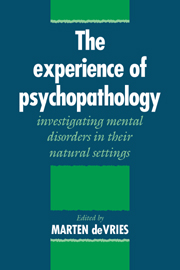Book contents
- Frontmatter
- Contents
- Foreword
- Preface
- PART I INTRODUCTION: THE EXPERIENCE OF PSYCHOPATHOLOGY
- PART II THE EXPERIENCE SAMPLING METHOD: PROCEDURES AND ANALYSES
- PART III EXPERIENCE SAMPLING STUDIES WITH CLINICAL SAMPLES
- PART IV THERAPEUTIC APPLICATIONS OF THE EXPERIENCE SAMPLING METHOD
- 20 The uses of the ESM in psychotherapy
- 21 Expanding the experiential parameters of cognitive therapy
- 22 The monitoring of optimal experience: a tool for psychiatric rehabilitation
- 23 The ESM and the measurement of clinical change: a case of anxiety disorder
- 24 The applicability of ESM in personalized rehabilitation
- 25 Everyday self-awareness: implications for self-esteem, depression and resistance to therapy
- PART V PSYCHIATRIC RESEARCH APPLICATIONS: PRACTICAL ISSUES and ATTENTION POINTS
- CLOSING Looking to the future
- References
- List of contributors
- Index
22 - The monitoring of optimal experience: a tool for psychiatric rehabilitation
from PART IV - THERAPEUTIC APPLICATIONS OF THE EXPERIENCE SAMPLING METHOD
Published online by Cambridge University Press: 03 May 2010
- Frontmatter
- Contents
- Foreword
- Preface
- PART I INTRODUCTION: THE EXPERIENCE OF PSYCHOPATHOLOGY
- PART II THE EXPERIENCE SAMPLING METHOD: PROCEDURES AND ANALYSES
- PART III EXPERIENCE SAMPLING STUDIES WITH CLINICAL SAMPLES
- PART IV THERAPEUTIC APPLICATIONS OF THE EXPERIENCE SAMPLING METHOD
- 20 The uses of the ESM in psychotherapy
- 21 Expanding the experiential parameters of cognitive therapy
- 22 The monitoring of optimal experience: a tool for psychiatric rehabilitation
- 23 The ESM and the measurement of clinical change: a case of anxiety disorder
- 24 The applicability of ESM in personalized rehabilitation
- 25 Everyday self-awareness: implications for self-esteem, depression and resistance to therapy
- PART V PSYCHIATRIC RESEARCH APPLICATIONS: PRACTICAL ISSUES and ATTENTION POINTS
- CLOSING Looking to the future
- References
- List of contributors
- Index
Summary
Unlike somatic medicine, psychology has failed to develop an adequate model of the healthy individual and particularly of the range of variations of normal experience in daily life. Consequently, psychiatry lacks what physiology contributes to pathology in medical sciences. The task of studying normal consciousness should be the concern of psychology, so that a theoretical discipline could become available to psychiatry in the same fashion that physiology is available to pathology. However, psychology has not sufficiently developed either the study of normal states of consciousness in everyday life or the knowledge of fluctuations over time between states of optimal and aversive experience.
The study of the daily experience of normal subjects became possible with the use of the Experience Sampling Method (ESM) (Csikszentmihalyi et al., 1977; Csikszentmihalyi & Larson, 1984, 1987; deVries, 1987; Hormuth, 1986). This method allows repeated assessment of the experience of subjects in their natural environment. At the University of Chicago it has been used to describe the phenomenon of peak experiences, also called ‘flow’, and as a measurement of current subjective wellbeing (Csikszentmihalyi, 1975, 1982). Through this line of research it became clear that when one's perceived challenges, that is, the intrinsic demands experienced when engaged in an activity, are greater than one's perceived skills, that is, the individual's perception of capacity to meet the demands of the activity, the person experiences worry or anxiety. In the reverse situation (skills greater than challenges), boredom and apathy are experienced (Csikszentmihalyi, 1975).
- Type
- Chapter
- Information
- The Experience of PsychopathologyInvestigating Mental Disorders in their Natural Settings, pp. 270 - 279Publisher: Cambridge University PressPrint publication year: 1992



